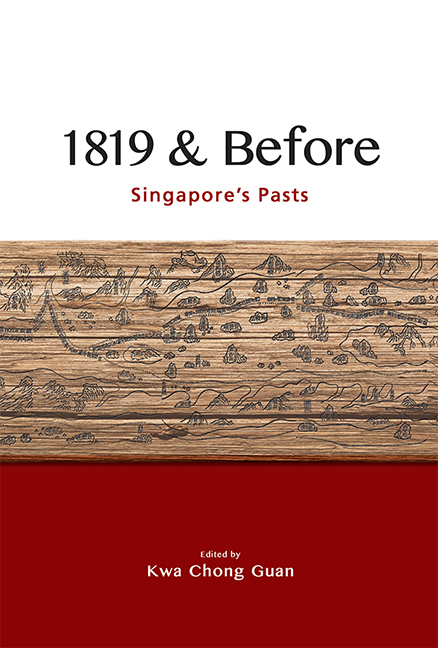Book contents
- Frontmatter
- Contents
- Foreword
- Acknowledgments
- Contributors
- 1 Introduction: Approaches to Singapore’s Past before 1819
- 2 Issues and Approaches to Studying Singapore before 1819
- 3 Regional Influences, International Geopolitics and Environmental Factors in the Rise and Demise of Temasek
- 4 The Mysterious Malay Jong and Other Temasek Shipping
- 5 The Orang Laut and the Negara Selat (Realm of the Straits)
- 6 Avoidance of Shipwreck in the Malay Annals: A Trope in Buddhist Narratives of Maritime Crossings
- 7 The Inception of Lion City
- 8 A Note on Amoghapāśa-Lokeśvara in Singapura
- 9 Portuguese and Dutch Records for Singapore before 1819: An Overview
- 10 Zheng He’s Navigation Methods and His Visit to Longyamen, Singapore
- Bibliography
- Index
2 - Issues and Approaches to Studying Singapore before 1819
Published online by Cambridge University Press: 09 October 2021
- Frontmatter
- Contents
- Foreword
- Acknowledgments
- Contributors
- 1 Introduction: Approaches to Singapore’s Past before 1819
- 2 Issues and Approaches to Studying Singapore before 1819
- 3 Regional Influences, International Geopolitics and Environmental Factors in the Rise and Demise of Temasek
- 4 The Mysterious Malay Jong and Other Temasek Shipping
- 5 The Orang Laut and the Negara Selat (Realm of the Straits)
- 6 Avoidance of Shipwreck in the Malay Annals: A Trope in Buddhist Narratives of Maritime Crossings
- 7 The Inception of Lion City
- 8 A Note on Amoghapāśa-Lokeśvara in Singapura
- 9 Portuguese and Dutch Records for Singapore before 1819: An Overview
- 10 Zheng He’s Navigation Methods and His Visit to Longyamen, Singapore
- Bibliography
- Index
Summary
Archaeological research began in Singapore in 1984. Since then, over half a million artefacts have been recovered from systematic excavations. These remains fall into two periods: the Temasek era (fourteenth to sixteenth century) and the Singapore era (1819 to the present). Historical sources from the seventeenth and eighteenth centuries demonstrate that during this time Singapore was still a source of maritime manpower for rulers vying to control the local waterways, and that ships took on provisions here, but the only artefacts on land that date from this 200- year period are two ceramic sherds excavated at St. Andrew's Cathedral.
The artefacts from excavations are reliable proof that Singapore was home to a sophisticated multicultural society with a complex set of links to local and long-distance trade before 1350. Although these basic outlines of ancient Singapore are now clear, there are still important questions about Singapore's history that further research, including work in laboratories and archives, may be able to answer. The important questions concern the provenance of artefacts, many of which were not made locally but were imported; the nature of Singapore's ancient ecology and environment; reconstruction of artefacts; statistical analysis of intra-site variation; and comparisons with other sites in the region.
Texts, Legends and Surface Finds
The Malay Annals
The pre-colonial artefacts from Singapore confirm the hypothesis that Singapore in the fourteenth century corresponded closely to the way it was depicted in the Malay Annals as a bustling multi-ethnic port. The Malay Annalsare not entirely reliable as a historical source; they were compiled for a political purpose, to support the claims of the Malay royal family who ruled Melaka in the mid-fifteenth century, when Islam replaced esoteric Buddhism as the main religion in the court. Numerous recensions of the Malay Annalsexist; the oldest version, and the one probably closest to the original, is known as the Raffles MS 18. This was composed in Johor in the early seventeenth century, apparently just after Singapore had been devastated by an attack by Aceh. The composer himself may have been a Singaporean; this would account for the fact that the first sections glorify Singapore as the first great Malay trading port.
- Type
- Chapter
- Information
- 1819 & BeforeSingapore's Pasts, pp. 11 - 22Publisher: ISEAS–Yusof Ishak InstitutePrint publication year: 2021



